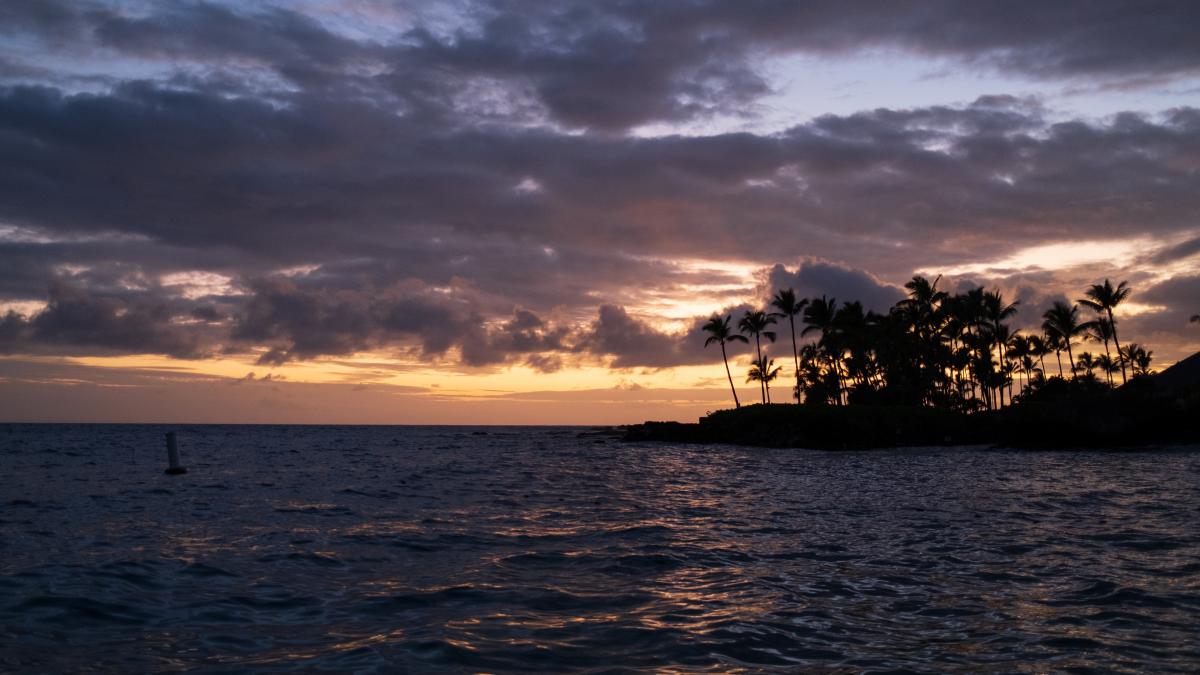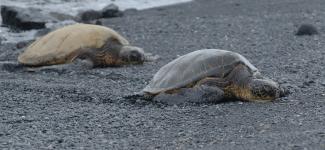Studying on the Hawai'ian shore or learning about policymaking at the European Union HQ is all within reach for UBC students taking Global Seminars. Led by UBC faculty and supported by Go Global, these special offerings give UBC students the chance to explore topics in-depth in small groups on-location around the world.
This year, students had 30 different seminars to choose from and most are new: the FEST Film Festival Program in Espinho, Portugal, as well as The Sibiu International Theatre Festival in Sibiu, Romania; the four new Forestry field schools in Ecuador, Chile, Europe and South Africa; French Literature in Lyon; and Romance Studies in Barcelona. Some 400 UBC students will be journeying to 26 countries led by professors from 25 departments across eight faculties. And, there's funding available. Participants will receive $850,000-plus in student awards for Global Seminars in 2023.
UBC undergrad Josh Lee took the nine-day Island of Hawai'i field course on Systems Approaches to Regional Sustainability this past February with Faculty of Science Professor Lee Groat and Integrated Sciences Lecturer Denise Gabriel. Here's what Lee had to say about the experience.
The UBC Global Seminar class decending down a lava tube in Hawa'ii (photo: Ahmed Neelim Novo)
Before you go
Why did you pick Hawa'ii? How did you hear about it?
I chose this particular Global Seminar because I always wanted to take part in a Go Global program that could potentially be beneficial for both my own personal growth and expanding my studies by travelling to a different environment. I had previously applied for Go Global, but those opportunities were unfortunately cancelled due to the COVID-19 pandemic travel restrictions. And since this is my last full year as an undergraduate student, one I regret I had was not reapplying again for any exchange program. When I came across the Hawai'i Global Seminar through the Go Global Instagram page and heard more from friends, I thought this would be a fantastic idea.
What was the application process like? Any tips?
For the application, be honest with your responses when filling out the statement of interest section. Instead of writing about what you think a Go Global advisor reviewing your application would want to hear, write your responses intentionally. For instance, discussions about wanting to improve your personal growth is a valid topic to consider in your response.
During the experience
How was it overall? What did you learn?
Overall, I had a memorable time because it exceeded all my expectations. In terms of academics, I found that being able to do an in-person field study allowed me to stay more engaged and interested in the topics related to environment and sustainability, and systems thinking. While learning through lectures and videos are still generally effective, having the privilege to be in Hawai'i for both studying and having fun was something I’d only imagined doing during my undergraduate years.
On the personal side of things, this was an amazing and impactful change of scenery from the usual routine back home in Vancouver.
How were the academics?
Choosing to attend this program was a big risk for me because it involved stepping outside of my comfort zone in terms of the courses I would usually consider taking. As an arts student studying human geography and urban studies as my major and minor, respectively, the thought of taking an integrated sciences course seemed intimidating at first. But I realized the topics discussed within the seminar, including sustainability, were subjects that were not too different from what I have studied in the past.
The pre-departure course was comprised of five modules with quizzes that provided both context and preparation for what we would witness in Hawa'ii. During the trip itself, we were encouraged to take notes and see the Big Island of Hawai'i from a sustainability lens that considered various social, environmental and economic factors at all the different stops and locations we visited.
Towards the end of the trip, we used our notes to answer questions on a final exam that encouraged us to reflect on what we saw. This reflection continued through a project that required us to think about a system (eg, water) in Hawai'i.
After academic sessions and field work, the class explored the local Hilo farmers' market (photo: Moloud Mazaheri)
How was the social social aspect of the trip?
I got extremely lucky with the friends I met in this Global Seminar. With a group of 13 students including myself, it was very easy to take the time to get to know one another throughout the week. We also formed food groups for grocery shopping and meal prepping, so that was another opportunity to form new friendships. The teaching staff were also very friendly and knowledgeable throughout the entire trip. They made it clear that they were all both passionate about the topics at hand and willing to get to know each student on a personal and academic level.
It felt a bit like joining the teens club on a cruise ship. You have a group of 13 people with different backgrounds coming together at first not knowing each other and then feel like friends of many years by the end of it. Everyone got along well, and we made efforts to do group activities together during free time or other excursions.
We stayed in an Airbnb near the town of Hilo that included three rooms, a dining room and an entire kitchen. There was also space outside to both explore and enjoy the tropical Hawai'ian climate. This would become our home and ultimately a space where many friendships were formed.
What was the typical day like?
Beginning early by waking up at 6:30 am. If the weather was nice, there would be time to watch the sunrise at a nearby lookout point. A whiteboard would be posted and updated the night before each day that would include the itinerary of locations or events, and things to pack and wear. The meeting time to be ready to go was often at 8 am sharp, so waking up early gave us enough time to make breakfast and prep for the long day to come.
We would be sorted into three vans by drawing names from a hat, and drives would range from a quick 15-minute drive to two hours from the town of Hilo to Kona.
Each stop at either a lookout points or short walk to a specific site would include a brief lecture from one of the professors that provided context and information about the sites. Each day would last around 6 pm, with grocery stops every two days or so. In the evenings, we would have time to cook dinners with our groups, catch up on work or notes and sometimes participate in activities inside the media room of the house.
Quiet time was around 10 pm, so this gave us the opportunity to play, lounge around and play group games, including card games and Mafia. By this time, most people would return to their rooms and sleep early to prepare for the next day’s adventure.
UBC students Josh Lee, Cameron Leong and Jennifer Lim at Hawai'i's Akaka Falls on a very rainy day (photo: Ahmed Neelim Novo)
What was your favourite memory?
Sitting in a hot spring with my entire class. This moment to me was something that I never imagined doing during my four years of undergraduate studies. Other fun memories included taking on the wild and rough waves during body surfing at Hapuna Beach, and taking in the beautiful scent of the Hawai'ian ocean during snorkeling at Two Step Beach.
Another notable memory was visiting a federal park called “The Place of Refuge.” Not only was it the sunniest and hottest day of the trip, the sites that we saw were both beautiful and full of past historical contexts that were expanded upon during an impactful talk from a local Hawa'iian native. It is important to consider past Indigenous contexts in Hawa'ii because it helps form a better understanding of the very land we were both standing upon and engaging with.
Any challenges or hiccups? How did you overcome them?
Unfortunately, it rained most of the time during our entire stay on the Big Island. While it was expected given that our Airbnb was located on the rainy part of the island near the town of Hilo, it was both very rainy and overcast at most of the stops, including Volcano National Park. Many of us expected clear skies and sunny weather almost every day, so the timing for the various rain storms was unfortunate.
Luckily, the humid and tropical climate of Hawa'ii made the rain less cold, so we were able to still dress in shorts and T-shirts. We all tried to maintain a positive attitude despite the poor weather because it was still a privilege to even be in Hawai'i for school in the first place! This helped keep morale up.
After the experience
Would you recommend this experience to other students? What can they look forward to?
I would absolutely recommend taking this or any Global Seminar if there is that opportunity for both the learning experience in the field and for the potential friends you can make along the way! You can look forward to the opportunity of learning and living alongside other classmates that have similar interests in the topics you’ll be studying. A Global Seminar is also a great way to do a shorter international experience that allows you to gain UBC course credits without going through the transfer credit process.
Read more about Go Global's Global Seminars.

The sun setting along the shores of Kona on the final Global Seminar day (photo: Ahmed Neelim Novo)
